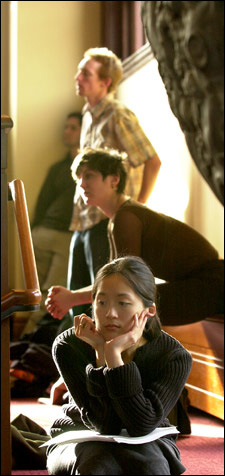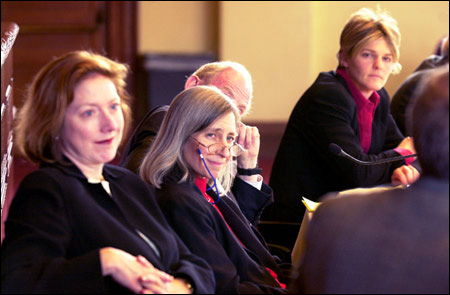Public vs. private obligations debated:
School vouchers, outsourcing, role of religion explored in Law Review symposium

Do government values such as equality and freedom of speech accompany government duties when services are farmed out to private organizations, or should the government leave values out of it and award contracts on the basis of who can do the best job?
Those questions got an airing Tuesday (March 11) at Harvard Law School’s Ames Courtroom where a panel of authorities debated the increasing trend to privatize functions formerly performed by federal and state governments.
The panel discussion, called “Public Values in an Era of Privatization,” was sponsored by the Harvard Law Review as its March 2003 Symposium and moderated by Daniel and Florence Guggenheim Professor of Criminal Justice Policy and Management Mark Moore, who also serves as director of the Hauser Center for Nonprofit Organizations.
It included Law School Professor Martha Minow, Stanford Law School Dean Kathleen Sullivan, and University of California, Los Angeles Law School Professor Jody Freeman. It also included University of Toronto Law Professor Michael Trebilcock, Rabbi David Saperstein of the Religious Action Center of Reform Judaism, and Brent Coffin, director of the Joint Program on Religion and Public Life, a collaboration between the Harvard Divinity School and the Hauser Center for Nonprofit Organizations.
The symposium was prompted by a trend toward privatization in its many faces, including school vouchers for parents to use at private and religious schools, contracting out of major programs such as welfare, and the Bush administration’s push for faith-based initiatives to address social issues.
Minow wrote the lead article for the March 2003 issue of the Harvard Law Review that provided the central focus for the discussion. Minow, in introducing the topic, said she was particularly worried about the debate over school vouchers. The U.S. Supreme Court’s decision last summer allowing their use for religious schools, she said, had pushed her concern from one over abstract ideals to concrete reality.
“My inner torment is turned into, ‘Now what do we do?’” Minow said. “It’s happening. It’s not anymore an academic question.”

Minow said subsequent research showed her that privatization is nothing new – in fact, she said, many services we now think of as the purview of government were once provided by private organizations. Even the contracting of government services to religious organizations isn’t new, she said. In fact, she said, economists would consider the tax exemption for religions as a form of subsidy, so government has been in the business of supporting religion for a long time.
Central to the debate, however, is what happens to the public values espoused and adhered to by the government – equal access for both sexes and members of racial, religious, and ethnic minorities, for example – when functions are farmed out to the private sector.
Are the private contractors bound by public values when they take over a previously public government function? Or is the reason they’re perhaps better at performing a function because of particular characteristics of the group that may not reflect public values?
These questions are critical in the debate over privatization, Minow said, and she’s concerned that most people aren’t aware of them.
“I’m most worried that most people don’t know anything about what we’re talking about,” Minow said.
Debate at the symposium ranged from the philosophical to the practical. Some panelists worried about the effect tearing down the wall between government and religion would have. Their worries, however, covered a wide spectrum. The increased performance of government duties – such as education or caring for troubled teens – could create a group of “favorite religions” which get the largest share of government dollars. On the other hand, increasing government oversight that accompanies the funding could also cause internal changes to the organizations, affecting their function as religious organizations.
Two panelists, Freeman and Trebilcock, took a practical tack, saying that the debate ought to be more broadly focused on the vast number and scope of services that the government is turning over to private contractors, from garbage collection to prison services. How that’s done and whether that makes sense, they said, ought to be the critical issue.
“I think there’s a larger set of issues on the table,” Freeman said. “How do you make sense of the current entanglement? There’s no going back. Religious organizations are deeply entwined already.”
Trebilcock said the focus on religion is simply misplaced. Government, he said, ought not to get tangled up in the debate and ought to focus simply on whether an organization can do a better job than the government can.
“I’m baffled by this preoccupation,” Trebilcock said. “If there’s a religious group out there that can reduce teen pregnancy, then go for it. The question is ‘Can they do the job?’”




